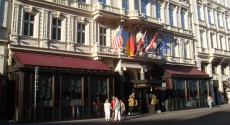How to exchange money in Austria
In order to create a realistic budget for a trip to Austria, you should start exchanging money while you're planning the trip. You could use your local bank or a credit card, but they cost you money because of transaction fees, service charges and inflated currency exchange rates. Credit card exchanges will cost you more than bank exchanges. They add a transaction fee, plus an additional fee to every exchange and use their own profit-filled exchange rate, plus add a purchase surcharge to every trip purchase, so you never know how much you're actually spending until you get your statement, and that's usually budget breaking news. That's why a debit card makes sense. Debit cards do charge a transaction fee, but they don't charge a purchase surcharge fee and you usually get a better rate of exchange.
The banks in Austria will also exchange money for you. They're open from 8am to 3pm on every business day except Thursday. The banks stay open until 5:30pm on Thursdays, but they take an hour lunch between 12:30 and 1:30 everyday. You can use your debit card to exchange money in the ATM machines in Austria, but you need a four digit pin number to use them. Most Austrian banks do charge a transaction fee of 1% and some charge a foreign exchange fee as well, plus the exchange rate may not be a real time rate, so waiting to exchange money with a bank in Austria can also cost you valuable spending money. Hotels know you like the convenience of exchanging currency with them, and they make you pay for that luxury. They could take another ten percent out of your budget, which means they can cost you twenty percent over a bank rate and that is not usually earmarked in your budget.
The best way to develop an effective budget is through a currency exchange broker. A broker watches the currency market constantly, so you will always get a real time rate, without excessive transaction fees, service charges and bogus exchange rates. A professional broker will help you average your exchanges. Averaging is exchanging small amounts of money during the planning stage, which offsets sudden value surges in the Euro against your currency. A broker will also show you how to use future contracts to save money, if that exchange strategy works better for you. A broker does make a profit, but you know exactly what it is, so you can incorporate it into your budget before you leave home. Once a currency exchange is completed, the broker will send your money overnight through a secure delivery service. We like to use ForexTraders.com. They provide information about different exchange strategies, plus they have an accurate history of different currency pairs and future forecasts. ForexTraders.com always provides us with a real time currency rate without hidden fees and surcharges. Their services are convenient, reliable, cost effective and confidential.
How to carry your money in Austria
There is no restriction on the amount of cash you can carry through Austrian customs, but it's always a good idea to carry your cash in a money belt, hidden pocket or leg pouch that's secure and out of sight. Austria is a very safe country. Violent crimes are rare, but do occur in Vienna from time to time. Pickpockets are always lurking in tourist areas and around hotels, so use hotel safes and be aware of local security alerts. Your vacation in Austria will be a safe one if you remember that common sense is your best security tool when you use it.
More tips by GuidedToursAT
To get more tips about important issues when planning a holiday in Austria, please have a look at our useful tips section. To learn more about proper etiquette in Austria, please visit our behaviour guidelines page. Should you have any other questions, we would be pleased to help you: just write us an email to anytime!






